In the last 10 years, the global shift from traditional gaming to online fantasy sports has gained immense momentum, offering users an exciting platform to showcase their skills and earn rewards. Fantasy sports, where players form virtual teams and compete based on real-world game statistics, have captivated millions of users worldwide. With the global sports industry (As per Statista) projected to grow from $403 billion in 2022 to over $680 billion by 2028, the fantasy sports segment plays a pivotal role in this expansion.
For entrepreneurs and business owners, tapping into this booming market through fantasy sports app development is a big opportunity. The increasing demand for engaging, skill-based gaming apps has fueled the growth of fantasy sports, which provide both entertainment and potential financial rewards to users.
This 2025 guide offers insights into building a successful fantasy sports platform, ensuring you’re well-equipped to meet the evolving needs of today’s digital-savvy sports enthusiasts.
What Are Fantasy Sports Apps?
Fantasy sports apps are digital platforms that allow users to create virtual sports teams based on real players from various live sports events. These apps require users to verify their identity. Users can select players and earn points based on their real-time performance in matches. This engaging format enhances the excitement of watching sports and offers users the opportunity to earn money through their strategic team-building skills.
Types of Fantasy Sports Apps: A Breakdown for Beginners
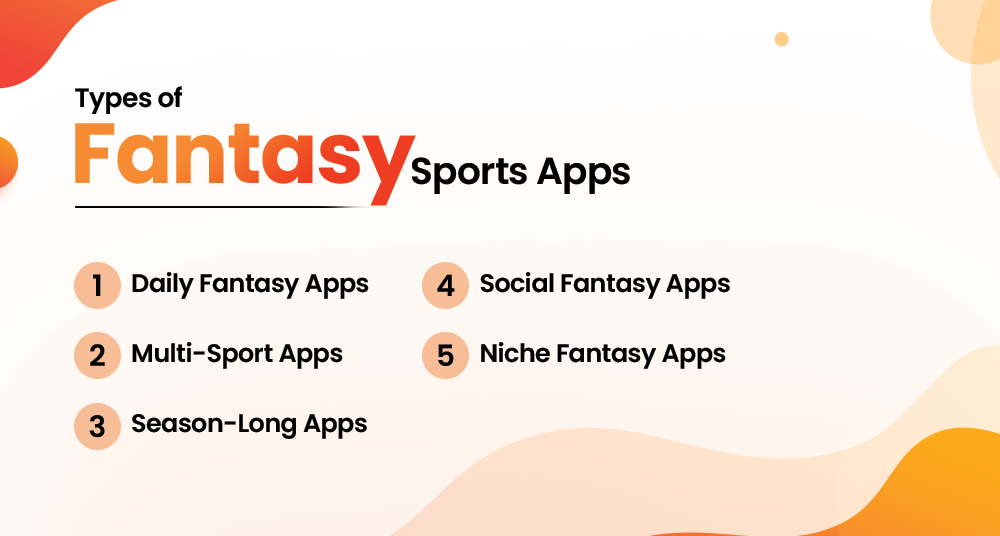
#1. Daily Fantasy Apps (DFS)
In these apps, users can create teams for daily matches, offering a fast-paced experience. It’s perfect for players who want quick results without a long-term commitment.
#2. Multi-Sport Fantasy Apps
These apps cover various sports, allowing users to participate in different fantasy leagues, such as cricket, football, basketball, etc., all in one place.
#3. Season-Long Fantasy Apps
Users form teams for an entire season, tracking performance over several weeks or months. It’s ideal for those who enjoy long-term engagement and strategy.
#4. Social Fantasy Sports Apps
These apps focus on community interaction, letting users play with friends and family, often including social features like chat and leaderboards.
#5. Niche Fantasy Sports Apps
These apps focus on less common sports, like fantasy kabaddi or rugby, offering fans of smaller sports a dedicated platform.
- Fantasy Football App Development
- Fantasy Hockey App Development
- Fantasy Baseball App Development
- Fantasy Tennis App Development
- Fantasy Cricket App Development
- Fantasy Basketball App Development
- Fantasy Rugby App Development
- Fantasy Kabaddi App Development
These cater to fans of specific sports, providing tailored features and gameplay based on the sport’s rules and player statistics.
How Do Fantasy Sports Apps Work?
Fantasy sports apps are digital platforms where users can create virtual teams of real athletes based on ongoing matches. Here’s how they work:
Select Match/League: Users choose a live match or league they want to participate in.
Draft Team: They pick real players to form their virtual team from the available athletes.
Select Captain & Vice Captain: Users choose a captain and vice-captain, who earn extra points for the team based on their performance.
Manage Team: Players can update their team lineup before the match starts, ensuring they have the best possible team.
Earn Points: Points are earned based on the real-time performance of the selected players in the match.
Determine the Winner: The user with the highest points, calculated from their team’s performance, wins the contest.
How Do Fantasy Apps Make Money?
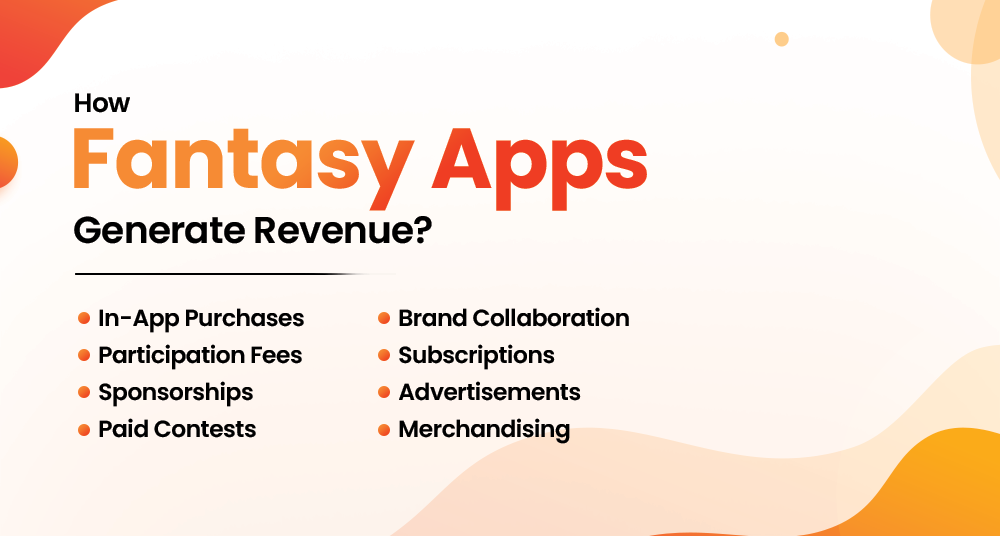
Fantasy sports apps generate revenue through various methods:
In-App Purchases
Users can buy virtual goods or premium features, such as team upgrades or advanced player stats, to enhance their gaming experience.
Participation Fees
Many fantasy apps charge entry fees for contests or tournaments. Users pay a fee to join, and winners receive a share of the prize pool.
Sponsorships
Companies often partner with fantasy sports platforms to promote their products. These sponsorship deals help boost the app’s revenue through brand placements and promotions.
Paid Contests
Fantasy sports apps offer special paid contests with higher rewards, attracting serious players who are willing to pay for bigger prize pools.
Brand Collaboration
Apps collaborate with sports teams, athletes, or other brands for marketing campaigns, generating additional income through these partnerships.
Subscriptions
Some apps offer premium subscription plans where users get exclusive benefits, such as access to advanced data, analytics, or VIP contests.
Advertisements
Ads within the app, including banner ads or video ads, provide a significant revenue stream as users engage with the content.
Merchandising
Fantasy apps can also sell branded merchandise like apparel, accessories, or gear related to popular sports or the app itself.
iGaming vs. Fantasy Sports Apps: What’s the Difference?
The key difference between iGaming and fantasy sports apps lies like gameplay. Fantasy sports rely heavily on skills, research, and strategy. Players need to analyze real-world athlete statistics, team performance, and game conditions to create winning teams. Success is largely based on the user’s knowledge and decision-making.
On the other hand, iGaming often leans more on luck, involving games like online casinos, poker, and slot machines. While some iGaming activities may involve strategy, outcomes are mostly chance-based, unlike the skill-driven approach in fantasy sports.
Fantasy Sports App Development: Must-Have Features
Having the right features in fantasy sports app development is crucial for success in the fantasy sports business. Key features include user-friendly interfaces, real-time updates, secure payment options, analytics tools, and social sharing capabilities to enhance user engagement and retention.
| User Panel | Admin Panel | Additional Features |
| User Registration & Login | User Management | Multi-Sport Support |
| Match/League Selection | Match Management | Referral System |
| Team Creation | Contest Creation & Management | Custom Scoring System |
| Player Stats & Analytics | Revenue Tracking | Custom Scoring System |
| Live Score Updates | Payment & Transaction Control | Player Injury Updates |
| Contest Participation | Analytics Dashboard | – |
| Leaderboard & Rankings | Content Management System (CMS) | – |
| In-App Chat & Social Sharing | Fraud Detection & Reporting | – |
| Push Notifications | Push Notification Management | – |
| Payment & Wallet Integration | Customer Support Management | – |
Benefits of Developing a Fantasy Sports App
Creating a fantasy sports app offers numerous advantages that can significantly impact both users and businesses. Here are 10 impactful benefits:
#1. Entertainment & Engagement
Fantasy sports apps provide a fun and interactive way for users to engage with their favorite sports. The thrill of creating teams and competing with friends keeps users entertained and coming back for more.
#2. Community Development
These apps foster a sense of community among users. Players can connect with friends, join leagues, and engage in discussions, creating a vibrant social environment that enhances user experience.
#3. Skills Development
Users develop valuable skills like strategic thinking, decision-making, and analytical abilities while managing their fantasy teams. This growth can translate into better sports knowledge and engagement.
#4. Financial Rewards
Many fantasy sports apps offer cash prizes for winning contests. This potential for financial gain attracts users who enjoy competition and are motivated to participate.
#5. Boost the Brand’s Visibility
By developing a fantasy sports app, brands can enhance their visibility in the sports industry. Effective marketing and partnerships can draw attention to the app and the brand behind it.
#6. Competitive Advantage
A well-designed fantasy sports app can provide a competitive edge in a crowded market. Unique features and a great user experience can set your app apart from others.
#7. User Data Insights
Fantasy sports apps generate valuable user data, helping businesses understand player preferences and behaviors. This information can guide marketing strategies and app improvements.
#8. Increased Fan Loyalty
Engaging users through fantasy sports can lead to increased loyalty towards a brand or sports franchise, creating long-term relationships with fans.
#9. Monetization Opportunities
There are various monetization strategies available, such as in-app purchases, subscriptions, and sponsorships, providing multiple revenue streams for developers.
#10. Mobile App Development Company Support
Partnering with a skilled mobile app development company ensures that your fantasy sports app is built with the latest technology and best practices, enhancing user experience and functionality. Moreover, leveraging fantasy sports software development can provide essential tools for app customization and scalability.
How Data Analytics Enhances Fantasy Sports Apps?
Sports data analytics greatly enhances fantasy sports apps by providing precise, data-driven insights. By analyzing player statistics, team performance, and game conditions, apps can help users make informed decisions when drafting their teams. This leads to improved gameplay and a more engaging experience. Additionally, real-time analytics keep users updated on player injuries and performance trends, allowing them to adapt their strategies quickly. Overall, data analytics fosters a competitive environment, making fantasy sports more exciting and strategic for players.
Useful Blog: Reasons to Invest in Fantasy Sports App Development
Essential Steps for Creating a User-Friendly Fantasy Sports App
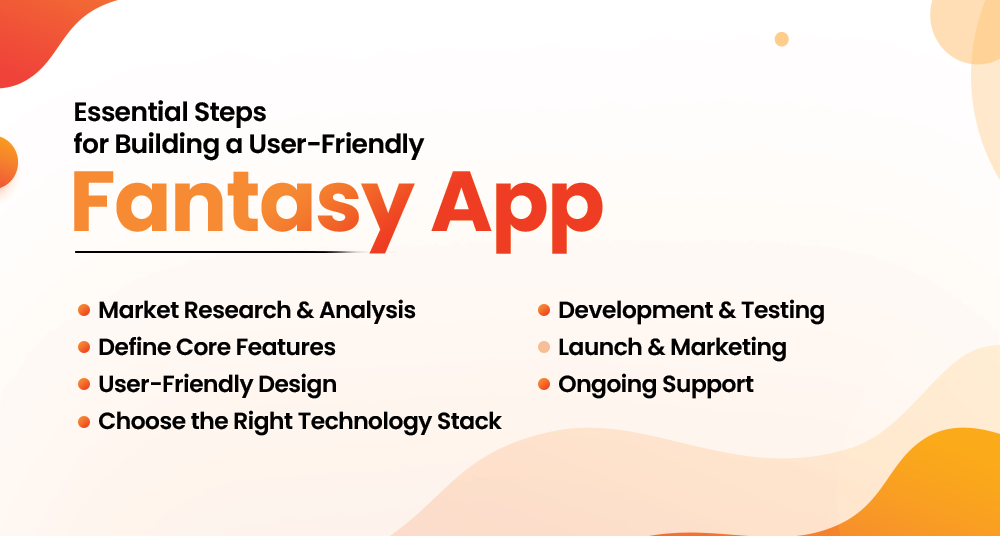
Creating a user-friendly fantasy sports app involves several essential steps that ensure a seamless experience for users. Here are the key steps to consider:
Market Research and Analysis
- Conduct thorough research to understand user preferences and market trends.
- Identify competitors and analyze their strengths and weaknesses to find your unique selling points.
- Determine your target audience and their needs to tailor the app accordingly.
Define Core Features
- Identify essential features such as user registration, team creation, live updates, and payment integration.
- Consider including social features like chat and leaderboards to enhance user engagement.
- Ensure a robust admin panel for efficient management and monitoring of app activities.
User-Friendly Design
- Create an intuitive and visually appealing user interface (UI) that simplifies navigation.
- Focus on user experience (UX) design, ensuring easy access to key functionalities without overwhelming users.
- Use clear and concise language throughout the app to make it easy for users of all skill levels to understand.
Choose the Right Technology Stack
- Select suitable technologies for front-end and back-end development to ensure scalability and performance.
- Utilize reliable APIs for real-time sports data integration, enhancing the app’s functionality.
- Consider working with a Fantasy App Development Company experienced in building high-performance fantasy sports applications.
Development and Testing
- Follow agile development methodologies for iterative progress and quick adjustments based on feedback.
- Conduct thorough testing to identify and fix bugs or usability issues before launch.
- Ensure the app performs well across different devices and platforms for broader accessibility.
Launch and Marketing
- Develop a robust marketing strategy to promote the app before and after launch.
- Utilize social media, influencer partnerships, and sports communities to reach your target audience effectively.
- Monitor user feedback post-launch to make continuous improvements and enhance user satisfaction.
Ongoing Maintenance and Updates
- Regularly update the app with new features, improvements, and security patches to keep users engaged.
- Analyze user behavior data to understand usage patterns and preferences, allowing for informed decisions on future updates.
Latest Trends in Fantasy Sports App Development
The fantasy sports app development market is evolving rapidly, driven by innovative technologies that enhance user engagement and experience. Here are some of the latest trends:
AR/VR for Immersive Experiences
Augmented and virtual reality are being integrated into fantasy sports apps to provide users with immersive experiences, allowing them to feel closer to the action and interact with their teams more engagingly.
AI Sports Coach
Artificial intelligence is revolutionizing how users approach team management. AI sports coaches analyze player data, offer strategic insights, and provide personalized recommendations, helping users make informed decisions.
Blockchain Payment Wallet
Blockchain technology is gaining traction in fantasy sports, offering secure, transparent, and fast transactions. Blockchain payment wallets enhance user trust and provide a reliable method for managing in-app purchases and cash prizes.
Wearable Technology
Integration with wearable devices enables real-time tracking of athlete performance. Users can access up-to-date stats and insights, enhancing their strategic gameplay and engagement with their favorite sports.
Common Challenges in Developing Fantasy Sports Apps
Clear Game Idea with Vision
Defining a clear game concept with a solid vision is crucial for success. Fantasy sports apps need to provide an engaging user experience while ensuring that the rules and gameplay are easy to understand. Clarity in purpose ensures that users are not confused and have a seamless experience.
Data Management
Handling large amounts of real-time sports data can be a challenge. Efficient data management systems are essential to process and update player statistics, match information, and user scores without delays.
Fast Contest Join in Real-Time
Ensuring that users can quickly join contests in real-time without lag is critical. Slow join processes can lead to user frustration and lower retention rates.
Currency Deposit and Withdrawal
Integrating secure, fast, and reliable payment gateways for currency deposits and withdrawals is essential. A poor payment experience can diminish trust and deter users.
Marketing the App
A successful fantasy sports app must have an effective marketing strategy to attract users. Competition is high, and innovative campaigns are needed to stand out in the crowded market.
Estimated Costs for Building a Fantasy Sports App
The estimated cost of building a fantasy sports app ranges from $4,000 to $20,000. This variation depends on several factors, including the app’s tech stack, level of customization, features, and user interface design. More advanced features like live data integration, multiple payment gateways, and real-time updates can increase costs. The final cost is highly customizable based on your specific requirements. To get an accurate estimate and complete cost structure, it’s recommended to connect with top fantasy sports app development companies. They can provide tailored solutions based on your project needs and budget.
Winning Strategies to Succeed as a Fantasy Sports Entrepreneur
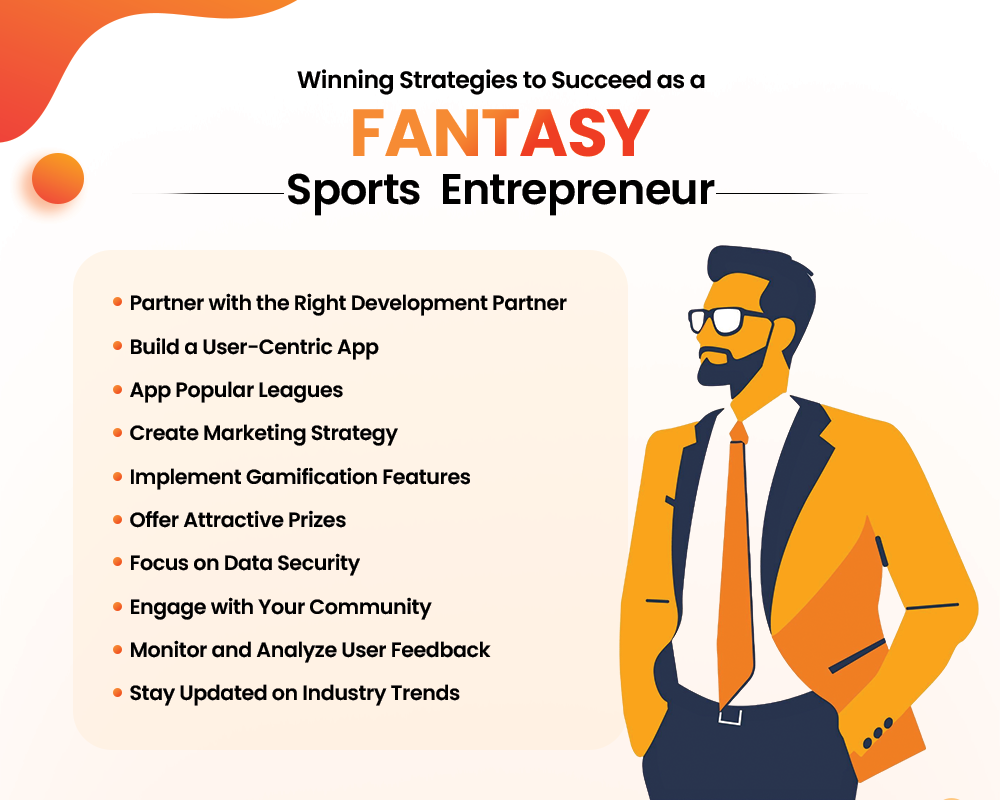
Partner with a Reputed Fantasy App Development Partner
Collaborating with an experienced app development company can ensure a high-quality, feature-rich platform that meets user expectations and industry standards.
Build a User-Centric App
Focus on creating an intuitive and engaging user experience. Understanding user preferences and behaviors can lead to higher retention rates and customer satisfaction.
Add Popular Leagues
Incorporating well-known sports leagues and events can attract more users. Offering a variety of leagues increases engagement and keeps the platform fresh and exciting.
Decide on Marketing Campaigns
Develop targeted marketing strategies to reach your audience effectively. Utilize social media, influencer partnerships, and content marketing to create buzz around your app.
Implement Gamification Features
Adding gamification elements, such as rewards, leaderboards, and challenges, can enhance user engagement and encourage regular participation.
Offer Attractive Prizes
Providing enticing prizes for winners can motivate users to join contests and promote word-of-mouth marketing, increasing user acquisition.
Focus on Data Security
Ensuring robust security measures to protect user data and transactions is crucial. Trust plays a significant role in user retention and brand loyalty.
Engage with Your Community
Foster a sense of community by interacting with users through forums, social media, and in-app features. Building relationships can enhance user loyalty.
Monitor and Analyze User Feedback
Regularly gather and analyze user feedback to identify areas for improvement. Adapting your app based on user input can enhance the overall experience.
Stay Updated on Industry Trends
Keeping abreast of industry developments and trends can help you innovate and stay competitive. Continuous improvement and adaptation are key to long-term success.
Frequently Asked Questions [FAQ’S]
How to Find the Right Fantasy Sports App Developer?
Look for developers with a proven track record in fantasy sports app development, strong portfolios, and positive client reviews. Evaluate their expertise in relevant technologies and post-launch support.
Which Technologies Are Used in Fantasy App Development in 2025?
In 2025, fantasy app development will leverage advanced technologies like artificial intelligence, machine learning, cloud computing, and real-time data integration to enhance user experience and engagement.
Do you Develop Customized Fantasy Apps Like FanDuel & DraftKings?
Yes, we specialize in developing customized fantasy sports apps tailored to your specific requirements, incorporating features similar to FanDuel & DraftKings for a unique user experience.




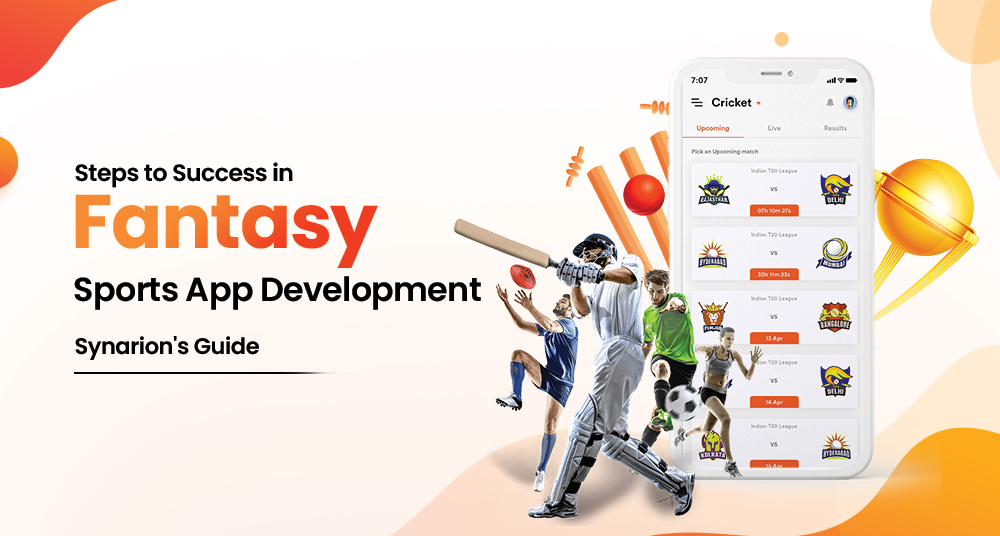

What do you think?
It is nice to know your opinion. Leave a comment.